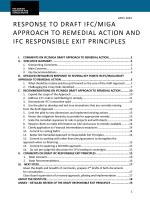
Submission to consultation on the proposed IFC/MIGA Approach to Remedial Action and Responsible Exit
The Danish Institute for Human Rights (DIHR) appreciates that the International Finance Corporation (IFC)/Multilateral Investment Guarantee Agency (MIGA)’s draft Approach to Remedial Action sets forth the important recognition that remedial action is a core part of IFC’s mission and mandate. It also recognises that IFC/MIGA are the first among development finance institutions to issue such a welcomed public acknowledgment. DIHR encourages IFC/MIGA to develop a more robust approach to remedial action in line with IFC/MIGA’s development mandate and past leadership in the sustainability space.
The DIHR comments called for a revised Approach to Remedial Action to:
- Acknowledge and address IFC/MIGA’s role in contributing to harm and therefore contributing to remedy.
- Commit to contributing to remedial action:
- when there are Compliance Advisor Ombudsman (CAO) findings of non-compliance and IFC contribution to harm, and
- in non-CAO cases where IFC learns that it has contributed to harm.
- Demonstrate leadership by committing to proactive steps to develop innovative financial products to support remedial action remedial action and to exploring alternative methods of resolving disputes.
- Address how remedy can be provided in more complex situations, such as with multiple actors involved in large-scale projects, in fragile and conflict-affected situations, or post-exit from an investment.
Additionally, the DIHR called for substantial revisions to the draft IFC responsible exit principles to clarify the principles and make explicit that responsible exit should be a cross-cutting consideration for all projects and not leave behind unremedied harms.
The DIHR submission draws from the expertise of the Human Rights and Business Department, which has worked for over 20 years with development finance institutions and other financial institutions, companies, states and civil society to build a global environment in which negative impacts on human rights by business activities are minimised, including through implementation of the UN Guiding Principles on Human Rights and the OECD Guidelines for Multinational Enterprises.
We strive to make the pdf versions of our publications etc. accessible for screen readers. If you experience any problems, please contact Digital Editor Stine Juhl Nielsen on stni@humanrights.dk
